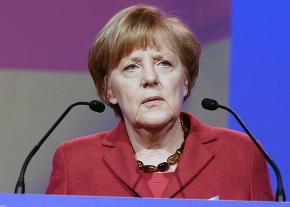Merkeling to the right
The German leader's backing of a burqa ban is another concession to Islamophobia, but we shouldn't be surprised, writes , in an article written for Jacobin.
MILQUETOAST JOURNALISTS and commentators the world over were shocked when Angela Merkel, German chancellor and leader of the country's dominant conservative party, the Christian Democratic Union (CDU), reversed her position on the introduction of a "burqa ban" last week.
The same woman who had been declared a last bastion of Western, liberal values by many a professional talking head was now stating to a party conference that she supports a ban on full-face veils in all situations where such a ban is legally and constitutionally permissible. Until now, Merkel had cautiously opposed the ban, despite growing dissent in the CDU. Her change of heart was met with thunderous applause and howls of delight from conference delegates.
Given the almost microscopic number of women who wear a burqa or niqab in Germany (perhaps even less than 0.01 percent of all women in the country), it's safe to assume that Merkel's rightward pivot is less about the veil itself than it is a signal to her base and the German public that her party is shifting to the right. Though many in the media seemed surprised by Merkel's announcement, her declaration was only the latest in a series of calculated retreats over the last few months, through which she hopes to put the CDU on war footing for the 2017 parliamentary elections, where she will seek re-election to a fourth term.

THE CHANCELLOR has found her tried and true rhetorical strategy of "Merkeling"--technocratic neoliberal equivocation sprinkled with shallow humanist phrase-mongering--increasingly ineffective against the rising wave of discontent and xenophobia that has found expression in the electoral successes of the Alternative for Germany (AfD), as well as a strong pull to the right in her own party and its Bavarian counterpart, the Christian Social Union. Voicing her support for a burqa ban is intended to shore up her support inside and outside of the party, while hopefully also undermining one of the AfD's main platform planks.
The move to support the burqa ban and the CDU conference's 51 to 49 percent vote in favor of abolishing the right to dual citizenship (against Merkel's explicit request) are two signals that German mainstream conservatism is set to catch up with the rightward drift happening in other parts of the continent.'
That said, on the whole, Merkel's speech said a lot more about how much things had stayed the same (or at least how much she wants them to) than anything else. Throughout the speech, the chancellor emphasized the "unique humanitarian emergency" with which the country and the world was confronted. She reassured her audience that "a situation like in late summer of 2015 cannot, should not, and must not be allowed to repeat itself," and stressed that not all of the refugees who had entered the country since then would be permitted to stay. Nevertheless, she said, "we must do what the times demand of us."
While also reaffirming the importance of treating asylum applicants as human beings and examining each application individually, Merkel is trying to communicate to German voters that the influx of refugees over the last year is not the beginning of a new, multicultural Germany in which non-ethnic Germans play an increasingly prominent public role, but rather a temporary exception due to a unique historical moment that she and her party are doing as much as possible to correct.
IN MOST other policy areas--the environment, the economy, etc.--Merkel adhered to established truisms and CDU talking points. She emphasized the necessity of keeping Germany's export sector competitive in the face of a rapidly changing global economy, fighting the menace of "radical Islam," and maintaining a balanced budget (an achievement of which she is particularly proud, describing her domestic spending as "pure sustainability"). As the potential for a center-left coalition at the national level grows, and with Merkel entering her twelfth consecutive year as chancellor, she and her party know that their only chance to emerge from next year's elections victorious is by promising voters more of the relative economic prosperity and stability of the last six years, minus the immigrants.
This is, in short, classic Christian Democratic triangulation, accommodating growing racist sentiment in the same way it did throughout the 1990s (when the party campaigned on anti-refugee slogans like "the boat is full") in order to hold together the coalition that has kept it in power for the last decade. Should this require tactically throwing Muslim women who choose to wear a full-face veil under the bus, then so be it. Most of them probably wouldn't have voted for her anyways.
Of course, the fact that this move was almost inevitable does not make it any less dangerous. As the ranks of the far right swell across Europe, anti-refugee messaging from above legitimizes and normalizes racism and xenophobia. Merkel's capitulation drives home the importance of independent left and antiracist movements capable of challenging both the far right and the political establishment in equal measure, rather than relying on benevolent ruling-class politicians to do it for us. After all, Angela Merkel and the conservative wing of Germany's political class didn't stop being a bastion of European liberalism and respect for human rights overnight--they never were to begin with (just ask the Greeks).
First published at Jacobin.




